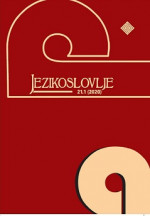Dvosložni i trosložni prijedlozi kao toničke riječi u osječkom govoru
TWO-SYLLABLE AND THREE-SYLLABLE PREPOSITIONS AS TONIC WORDS IN THE LANGUAGE VARIETY SPOKEN IN OSIJEK
Author(s): Lorna RajleSubject(s): Language studies, Language and Literature Studies, Theoretical Linguistics, Phonetics / Phonology, South Slavic Languages
Published by: Filozofski fakultet, Sveučilište Josipa Jurja Strossmayera, Osijek
Keywords: Croatian variety spoken in Osijek; pitch-accent system; accent retraction; proclitics; prepositions;
Summary/Abstract: One of the widely discussed problems of the orthoepic standard is the rule of the accent retraction to the proclitic when the tonic word has a descending accent, because in the Croatian standard there is inconsistency in relation to the „(non)obligatory shift of accents and the neutrality of such spoken realisations ...“ (Martinović 2018). Around the middle of the last century, it was observed that in the phrase consisting of the proclitic and the tonic word, the accent retraction depended on the length of the clitic and that it was more often performed when the clitic was shorter. This led to the rule of accent retraction in case of one-syllable and two-syllable clitics, whereas in words with three or more syllables the accent does not need to be retracted. However, this “adjusted” rule was not followed at that time and has not been followed since then, not even in the spoken language of some native speakers of the New Shtokavian variety. Delaš (2003) reports that New Shtokavian speakers retract the accent to the one-syllable preposition but they do not do so with two-syllable or multi-syllable prepositions. Therefore, the problem of accent retraction to the proclitic may be viewed not only in regard to the length of the tonic word, but also in regard of the length of the proclitic. Although the accent realisations of native speakers do not necessarily become part of the orthoepic norm, in order for the rule to become established, it is important to know the speech habits of as many speakers as possible, from different dialectal backgrounds. The paper describes the accentuating habits of Osijek residents with special reference to expressions in which the accentuated whole is made of a preposition with the personal, demonstrative, and reflexive pronoun. Its purpose is to establish whether preposition length in these phrases is related to the accent retraction to the proclitic.
Journal: Jezikoslovlje
- Issue Year: XXI/2020
- Issue No: 1
- Page Range: 81-92
- Page Count: 12
- Language: Croatian

